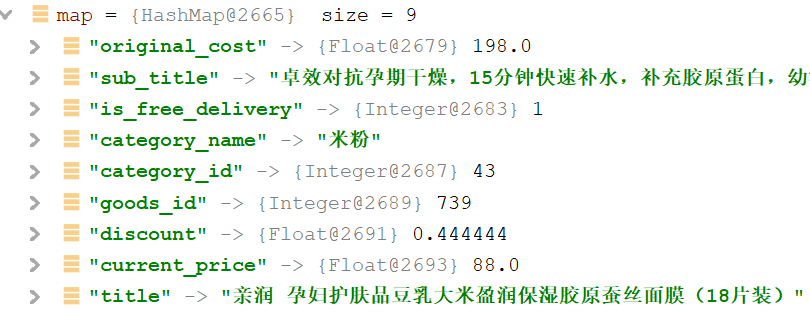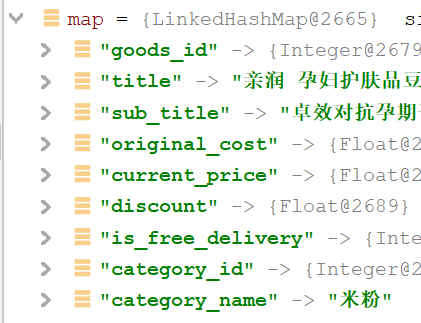架构设计
5161
MyBatis基本使用
声明:基于《基于Maven工程下的MyBatis框架+MySQL+连接池的数据查询操作》进一步拓展,相关配置文件、数据文件可阅上篇。
SQL传单/多参
在goods.xml新增两个<select>: <!--单参数传参,使用paramterType指定的数据类型即可,SQL中#{value}提取参数--> <select id="selectById" parameterType="Integer" resultType="com.imooc.mybatis.entity.Goods"> select * from t_goods where goods_id=#{value} </select> <!--多参数传参,使用paramterType指定Map接口,SQL中#{value}提取参数,这里的value为Map的key值--> <select id="selectByPriceRange" parameterType="java.util.Map" resultType="com.imooc.mybatis.entity.Goods"> select * from t_goods where current_price between #{min} and #{max} order by current_price limit 0,#{limit} </select>
在MyBatisTest.java测试类中新增两个方法: @Test public void testSelectById(){ SqlSession sqlSession = null; try { sqlSession = MyBatisUtils.openSession(); // 进行查询,传入的参数取的是在goods.xml文件的namespace名称和select id Goods goods=sqlSession.selectOne("goods.selectById",1602); System.out.println(goods); } catch (Exception e) { throw e; } finally { MyBatisUtils.closeSession(sqlSession); } } @Test public void testSelectByPriceRange(){ SqlSession sqlSession = null; try { sqlSession = MyBatisUtils.openSession(); // 进行查询,传入的参数取的是在goods.xml文件的namespace名称和select id Map param = new HashMap(); param.put("min",100); param.put("max",500); param.put("limit",10); List<Goods> list=sqlSession.selectList("goods.selectByPriceRange",param); for (Goods goods : list) { System.out.println(goods.getTitle()+"--"+goods.getCurrentPrice()); } } catch (Exception e) { throw e; } finally { MyBatisUtils.closeSession(sqlSession); } }
多表关联查询【Map--KEY对应数据库中的字段名】
新增t_category种类表 create table t_category ( category_id int auto_increment comment '产品分类' primary key, category_name varchar(32) not null comment '分类名称', parent_id int null comment '上级分类', category_level int not null comment '级别', category_order int not null comment '排序' )
在goods.xml新增两个<select>,随用其一,两者区别是让返回的Map集合无序/有序 <select id="selectGoodsMap" resultType="java.util.Map"> select g.*,c.category_name from t_goods g,t_category c where g.category_id=c.category_id </select> <select id="selectGoodsLinkedHashMap" resultType="java.util.LinkedHashMap"> select g.*,c.category_name from t_goods g,t_category c where g.category_id=c.category_id </select>
在MyBatisTest.java测试类中新增两个方法: //java.util.Map @Test public void testSelectGoodsMap(){ SqlSession sqlSession = null; try { sqlSession = MyBatisUtils.openSession(); // 进行查询,传入的参数取的是在goods.xml文件的namespace名称和select id List<Map> list=sqlSession.selectList("goods.selectGoodsMap"); for (Map map : list) { System.out.println(map); } } catch (Exception e) { throw e; } finally { MyBatisUtils.closeSession(sqlSession); } } //java.util.LinkedHashMap @Test public void testSelectGoodsLinkedHashMap(){ SqlSession sqlSession = null; try { sqlSession = MyBatisUtils.openSession(); // 进行查询,传入的参数取的是在goods.xml文件的namespace名称和select id List<Map> list=sqlSession.selectList("goods.selectGoodsLinkedHashMap"); for (Map map : list) { System.out.println(map); } } catch (Exception e) { throw e; } finally { MyBatisUtils.closeSession(sqlSession); } }


多表关联查询【Entity--KEY对应实体类中的字段名】
因为要用到实体类Goods,而多表查询的category_name属性值不被Goods包含,所以这里要对Goods进行扩展,但不在原有的实体类上修改,而是新建拓展类GoodsDTO.java,其中test属性是我测试属性,用AS命令添加的属性
package com.imooc.mybatis.dto; import com.imooc.mybatis.entity.Goods; /** * @Auther 徐士成 * @Date 2021-06-22 14:18 */ public class GoodsDTO { private Goods goods = new Goods(); private String categoryName; private String test; public Goods getGoods() { return goods; } public void setGoods(Goods goods) { this.goods = goods; } public String getCategoryName() { return categoryName; } public void setCategoryName(String categoryName) { this.categoryName = categoryName; } public String getTest() { return test; } public void setTest(String test) { this.test = test; } @Override public String toString() { return "GoodsDTO{" + "goods=" + goods + ", categoryName='" + categoryName + '\'' + ", test='" + test + '\'' + '}'; } }
这里借助resultMap结果集完成实体类映射:
<resultMap id="rmGoods" type="com.imooc.mybatis.dto.GoodsDTO"> <id column="goods_id" property="goods.goodsId"></id> <result column="title" property="goods.title"></result> <result column="original_cost" property="goods.originalCost"></result> <result column="current_price" property="goods.currentPrice"></result> <result column="discount" property="goods.discount"></result> <result column="is_free_delivery" property="goods.isFreeDelivery"></result> <result column="category_id" property="goods.categoryId"></result> <result column="category_name" property="categoryName"></result> <result column="test" property="test"></result> </resultMap> <select id="selectGoodsDTO" resultMap="rmGoods"> select g.*,c.category_name, '1' as test from t_goods g,t_category c where g.category_id=c.category_id </select>
@Test public void testSelectGoodsDTO(){ SqlSession sqlSession = null; try { sqlSession = MyBatisUtils.openSession(); // 进行查询,传入的参数取的是在goods.xml文件的namespace名称和select id List<GoodsDTO> list=sqlSession.selectList("goods.selectGoodsDTO"); for (GoodsDTO goodsDTO : list) { System.out.println(goodsDTO); } } catch (Exception e) { throw e; } finally { MyBatisUtils.closeSession(sqlSession); } }










